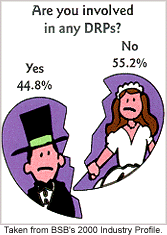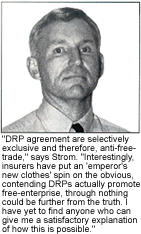As the man entered our office, he asked, “You’re not a DRP, are you?”
Assuring him we weren’t, he replied, “Good! This is where I’m having my car repaired.”
Later, he vented his past personal experiences with improper and inadequate repairs performed at direct-repair program (DRP) shops, to which he was directed at the insistence of insurers. He’s far from alone in his contention.
It was the insurance industry that conceived, suckled and pampered direct repair to its present self-righteous, aloof pubescence. To date, DRP relationships have become a widely accepted way of doing business for a great number of shops. And because of lack of cash flow, many can’t imagine doing business without them. Others, however, including some insurance representatives, have questioned the actual cost effectiveness of direct repair when all things are considered. They’ve also questioned direct repair’s intrinsic value and moral ramifications to consumers, repairers and insurers.
The past has exposed many weaknesses and abuses that direct-repair alliances promote, but only the future will reveal what form the practice will take – or if it will be reaffirmed illegal. Recent renewed interest in enforcing the 1963 Consent Decree – a directive from the U.S. Department of Justice that strictly limits or makes illegal many common insurer practices, including the practice of insurers’ steering of repair work – is on the horizon. In addition, liability-shedding directives by several insurers demand that shops wishing to maintain their DRP alliances must assume most, if not all, liability on virtually every aspect of the repair process – and hold insurers completely harmless. Insurers that haven’t yet taken this stance will, once others have tested the waters.
Why I Don’t DRP
I’ve chosen not to take part in DRPs for a number of reasons, but the main one is that I once was a DRP for a large insurer, and the experience, which seemingly started out on fairly level ground, quickly deteriorated once the honeymoon was over. Since then I’ve been told many times, “You can’t paint all DRP relationships with the same brush; times have changed and insurers have changed with them – they’ve seen the light.”
But have they? Can the leopard change his spots?

Insufficient time, parts and material allowances, so common in many DRP agreements, promote fraudulent cost-shifting on the part of participating repairers. Though this practice may not be common to all DRP relationships at the present time, once insurers establish “hold harmless” liability clauses, what’s to prevent them from pulling out all the stops?
“Never happen!” you say. But ask yourself: If you were in their position, what would you do? (Be honest, now). Hopefully, we’d all deal equitably with all parties concerned, but money, especially multi-billions, is an incredibly persuasive tool. It’s been said, “Money is the greatest god below the sky,” and that “There is no place invincible, wherein an ass [no reflection on either industry, of course] loaded with gold may enter.”
My years of experience with insurers, as well as my observation of other large industries, has been that the more “bucks up” they grow, the more suspicious, abusive and restrictive they generally become to those around them. I view insurers as reactionary where policymaking is concerned, and I’ve come to believe there are only three basic incentives that will alter insurance industry policy: extreme consumer disapproval, expensive legal judgments brought against them and more efficient/effective cost-containment measures.
Another reason I’m not a DRP: Through treating customers with the respect they deserve, educating them about their rights as insured motorists and using modest, effective marketing methods to attract new customers, there’s no incentive for me to “do DRP.” And you don’t have to DRP to be successful. Bob Juniper built his multi-location, multi-million-dollar collision repair empire without DRP relationships. Among other keys to his phenomenal success, he’s studied what makes good businesses tick, knows what consumers want and deserve, advertises heavily and knows from personal experience that dependence on DRPs is a one-way street. His customers come to him because they know he won’t be bullied by insurers.
As reported by John Yoswick of Image Output, according to Juniper, “I no longer have to jump on each job like a hobo on a ham sandwich. I can pick and choose my work. What a concept: I’m in control of my business, all accomplished by educating the collision repair customer. When the insurance industry tries to steer my customers away from me after I’ve explained on the radio what’s going on [with insurers and DRPs], those customers become hell-bent on coming to our shop.”
Juniper summed up his business philosophy in a May 2000, BodyShop Business article: “We’re more of a consumer advocate in the market, and we’re actually going head to head with the insurance companies rather than trying to cooperate with them.”
Educational advertising works, and Juniper is prospering proof.
DRPs: Bearing the Burden of Liability

I believe one main future objective of DRP relationships (often inaccurately extolled as being far more efficient than non-DRP shop relationships) is to shield the insurer from aggression – DRP shops holding much the same position as Goliath’s armor-bearer who “went before him” when David challenged him. I don’t believe it’s in the best interest of collision repairers to be used as a shield by insurers, deflecting the consequences of policy tenets that insurers made with policyholders.
But I believe DRPs have put shops in just that position: Insurers, increasingly seeking shelter from their exposure to legal and punitive damages, appear to be counting more heavily on liability-absorbing DRP shops to indemnify them. Whereas Goliath’s 9-foot frame made it impossible for his armor-bearer to adequately shield his one vulnerable spot, a growing portion of the legal profession is sizing up and challenging many present and past insurer policies and practices for their many legal weaknesses.
I believe the recent rash of legal judgments brought against insurers is only a drop in the bucket – and the repair industry has absolutely no business being in the middle of this coming fray. I believe repairers who continue in DRP relationships will soon find themselves in court, fighting for their existence against their repairer-partners who will be trying to hide behind the liability-shedding clauses they’ve made with their DRP shops. Considering the depth of insurers’ and subservient repairers’ pockets, I doubt any of these cases and class actions will be settled for pocket change.
I also believe DRP relationships are undermining free-enterprise and restraining free trade. One major hallmark of a democratic society is the freedom to operate our businesses, within acceptable guidelines, by our own conscience. If a business puts out an inferior product or service, no one will purchase it and that business will simply put itself out of business. DRP agreements, all insurer propaganda to the contrary, are selectively exclusive and therefore anti free-trade. Interestingly, insurers have put an “emperor’s new clothes” spin on the obvious, contending that DRPs actually promote free-enterprise, though nothing could be further from the truth. I have yet to find anyone who can give me a satisfactory explanation of how this is possible.
Jumping Off the DRP Bandwagon … Unscathed?
Influential “leaders” within our repairer associations have misled many shops into believing they can jump aboard the DRP train long enough to get a faithful following of clientele and then jump off any time they want with no adverse affects, taking their clientele-following with them. This professed “wisdom” is the result of industry “leaders” spending too much time playing golf and rubbing elbows with insurance representatives when they should be protecting and promoting genuine repairer issues. Very few shops, once on the DRP train, ever get off unscathed.
The exits I’ve read of, and personally known, have often been brutal. Several went from near total dependence on major insurers to having every last job from those same insurers successfully steered to competitors’ doors once they jumped train. The reason their “clientele” didn’t follow them: The same Homer-Milktoast customers their insurer-partner easily steered to their DRP shop were just as easily steered to competitors’ DRP shops (with a “find her in a bar; lose her in a bar” type of faithfulness). Why should DRP repairers expect anything different? Insurers don’t take rejection lightly.
I’ve gotten past the mentality where I felt I had to be the biggest to be the best. Tons of DRP work at little or no actual, honest profit is a sign of business stupidity and potential business suicide. I can visualize images of insurers rubbing their hands together in rapt anticipation whenever another shop goes deep into debt for shop space, tools and equipment to meet insurer promises of floods of DRP work. Insurers know an excessive debt-load tends to make repairers much more “bow and scrape” subservient – and more conformable to their dictates.
Thriving in a DRP Environment
How do I compete, being the only non-DRP shop within a many mile radius? How do I maintain an 80 percent customer repeat and referral rate, plus attract new clients?
People come to our shop because they know they’ll be treated fairly and professionally, and their vehicles will be properly repaired to as close to pre-loss condition as possible. Every job that leaves our shop carries a warranty good for as long as that person owns that vehicle. We adhere like glue to our original business philosophy: “Employ the best workers, strive for excellence in every repair and take exceptionally good care of the vehicle owner – and he’ll take exceptionally good care of us.” And never forget that it’s ultimately the vehicle owner, not the insurer, who writes our paycheck.
That, in a nutshell, explains how my business has remained competitive and prosperous. Years ago I asked a friend with a used car business how his competition was doing? His reply: “I have no idea how they’re doing. I just run my business to the best of my ability and do whatever I can to make my customers happy. I don’t concern myself with my competition.”
Pretty good game plan, isn’t it? Success in business isn’t a matter of whom you play games with but, rather, how you play the game.
Writer Dick Strom and wife Bobbi own and operate Modern Collision Rebuild, a 10,000-square-foot shop in Bainbridge Island, Wash.
|
Divide and Conquer?
More than any other force in the history of insurer-repairer relations, direct repair has successfully divided the collision repair industry through steering of work to “insurer-preferred” shops, resulting in greater cost controls upon all repairers. A mindset typical of most insurers concerning direct repair is encapsulated in the following quote from an insurance physical damage supervisor, responding to an article I recently wrote. His comment: “The U.S. collision repair industry is a $25 billion industry annually, with over $21 billion of that paid by insurers. This indicates that insurance companies are a large ‘customer,’ but it also indicates the ‘customer’ and the repair facility are partners in repair and, therefore, must strive to work harder to make this a more meaningful partnership. Direct-repair shops are just another one of the ingredients to cement that partnership.” He went on to say the insurer he represents doesn’t “ask any shop to take any type of shortcuts, use any substandard parts or perform repairs for lesser labor amounts. In no way do we intend to ‘steer’ work to certain shops, but instead to work with all shops.” That may appear to be true about the practices of certain companies, but considering the past record of the insurance industry as a whole, can we trust these guys to watch out for our best interests in the future? My years of dealing with insurers leads me to suggest we discontinue counting on any insurer to uphold anything other than his own best interests. |
|
An FYI on DRPs
51.6% of respondents to BSB’s 2000 Industry Profile say DRPs are bad for the industry. Reasons cited include:
|













